As the Rabbi spoke, the door of the Yeshiva was opened and someone yelled, “The Germans are coming!”… His last words to his students were these, “And do as our holy sages had done – pour forth your words and cast them into letters. This will be the greatest retribution that you can wreak upon these wicked ones. Despite the raging wrath of our foes, the holy souls of your brothers and sisters will remain alive. These evil ones schemed to blot out their names from the face of the earth, but a man cannot destroy letters. For words have wings; they mount up to the heavenly heights and they endure for eternity.” — THE BLEEDING SKY by Louis Bransdorfer.
You’ll see the day, ten years from now, when Adolf Hitler will occupy precisely the same position in Germany that Jesus Christ has now. — Reinhard Heydrich
“They were all basically similar. Dead bodies strewn across the campgrounds, piles of skin and bones, cadavers piled up like cordwood before the burning crematoria, helpless skeletons with diarrhea, dysentery, typhus, TB, pneumonia, and other ailments, retching in their louse-ridden bunks or on the ground with only their pathetic eyes pleading for help. Few had enough strength to muster a smile of gratitude. My mind would not accept what my eyes saw. It built a protective barrier to enable me to go on with my work in what seemed an incredible nightmare. I had peered into Hell.” — Benny Ferencz
And it shall come to pass that in all the land, saith the Lord, two parts therein shall be cut off and die; but the third part shall be left therein. And I will bring the third part through the fire, and will refine them as silver is refined, and will try them as gold is tried. I will say it is my people and they shall say, the Lord is my God. — Zachariah 13: 8-9
Churchill cast about for whatever means were possible to impede or halt the German atrocities…Churchill drafted a declaration that he then sent to Roosevelt and Stalin…All those responsible for, or having taken consenting part “in atrocities, massacres and executions” were to be sent back to the countries “in which their abominable deeds were done in order that they may be judged and punished according to the laws of those liberated countries.”
Churchill’s draft declaration continued: “Let those who have hitherto not imbued their hands with innocent blood beware lest they join the ranks of the guilty, for most assuredly the three allied powers will pursue them to the uttermost ends of the earth, and will deliver them to their accusers in order that justice may be done.” Such a declaration, Churchill believed, would make at least “some of these villains shy of being mixed up in butcheries now that they know they are going to be beat.” — CHURCHILL AND THE JEWS by Martin Gilbert
“I believe we should put an end right now to all this sniffing out Nazis. Count on it; once we start, who knows where it will all end.” — West German Chancellor Konrad Adenauer, 1952
“If the Holocaust never happened, then where is my family?” — Leon Reich, survivor
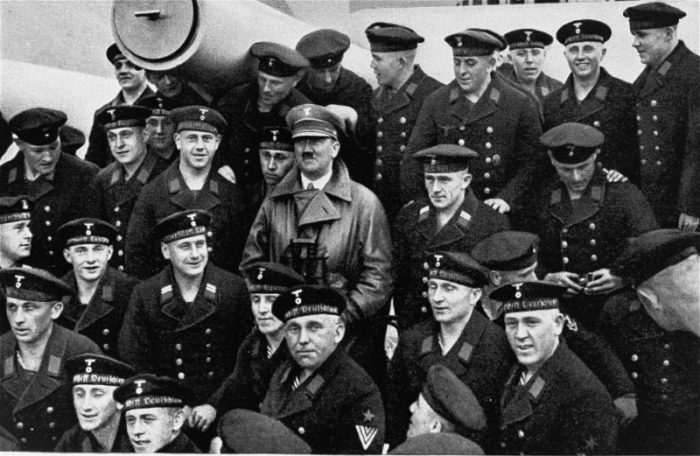
Adolf Hitler poses in 1935 with a group of sailors aboard a German armored cruiser, the Deutschland.
“Our prayer today is for the commemoration of the rising which broke out in the Warsaw ghetto on 19 April 1943. It was directed against the Nazis who entered the ghetto to round up the small remnant of its original 400,000 inhabitants in order to deport them to the gas chambers of Treblinka. Mordechaj Anielewicz took command of some 800 men equipped with home-made guns and explosives smuggled in by the Polish Underground. They continued fighting the Germans equipped with artillery, tanks and aircraft until the last days of May. On 19 April the Jewish Organizacja Bojowa, the Fighting Organization, issued the following declaration:
‘Jews! The hour of deed and revenge against the occupant has struck. All those capable of carrying arms must join us. Old people and women must help. To arms!’
“That day, the Germans, on entering the ghetto were greeted with grenades and handgun fire and had to withdraw after a few hours. They soon responded by blowing up and burning all the buildings, streets and whole districts one after the other. On 23 April the fighters issued another proclamation, which read:
‘Amongst the fires, the smoke and the blood of the murdered in the ghetto we send our last address to the world outside: we may all perish but we shall not surrender. We fight for our freedom and yours.’
“They fought in the name of human dignity. In the Ghetto Rising 7,000 Jews were killed, 5,000 burnt to death, 15,000 sent to perish in the gas chambers. They gained no military successes and did not live to enjoy the final victory of good over evil – but this first mass act of open resistance against the German occupants and its moral significance are written into Europe’s history.” — SAVED BY MY FACE by Jerzy Lando
“He told his men never to use infants for target practice nor smash their heads against a tree. He ordered his men to allow the mother to hold her infant to her breast and to aim for her heart. That would avoid screaming and would allow the shooter to kill both the mother and the infant with one bullet. It saved ammunition.” — Otto Ohlendorf
It must be made quite clear – terrifying though it is – that we are immediately faced with the decision: National Socialist or Christian. — Dietrich Bonhoeffer
“When people speak about the Holocaust these days, they often say ‘Never forget.’ I certainly agree with them, but before you can pledge to remember something, you have to know it to begin with.” — Michael Gruenbaum
The historian Simon Dubnow, who lay ill, had been overlooked during the first massacre. The second time he was caught in the dragnet. The sick and feeble ghetto inhabitants were brought to the execution area in buses; as Dubnow could not board the bus fast enough, one of the Latvian guards shot him in the back of the head. The next day, he was buried in a mass grave in the ghetto. According to rumor, on his way to the bus, Dubnow repeated: “People, do not forget; speak of this, people; record it all.” — NAZI GERMANY AND THE JEWS 1933-1945 by Saul Friedlander
This mind-staggering network of camps – housing, handling, immiserating, exploiting, and killing millions of innocent, martially and physically unthreatening people – was the largest institutional creation of Germany during its Nazi period. It was the largest not just because of the enormous number of installations, not just because of the millions of people who suffered within its confines, not just because of the vast number of Germans and German minions who worked in and for these camps, but also because it constituted an entirely new sub-system of society. — HITLER’S WILLING EXECUTIONERS by Daniel Jonah Goldhagen
My dear lady, we have fallen into the hands of criminals. How could I ever have imagined it! — Hjalmar Schacht
“My interest here was only in the number of transport trains I had to provide. Whether they were bank directors or mental cases, the people who were loaded on these trains meant nothing to me.” — Adolf Eichmann
“[Adolf Eichmann] was completely obsessed with his mission and also convinced that this extermination was necessary in order to preserve the German people…if he could succeed in destroying the biological basis of Jewry in the East by complete extermination, then Jewry as a whole could never recover from that blow.” — Rudolf Hӧss
Hitler, concludes the Führer’s biographer Ian Kershaw, was the supreme spokesman for an ideological imperative to which his followers gave enthusiastic consent. “Without Hitler’s fanatical will to destroy Jewry, which crystallized only by 1941 into a realizable aim to exterminate physically the Jews of Europe, the Holocaust would almost certainly not have come about.” The final solution represented Hitler’s will. Hitler was the supreme architect of the Jewish catastrophe. — PERPETRATORS by Guenter Lewy
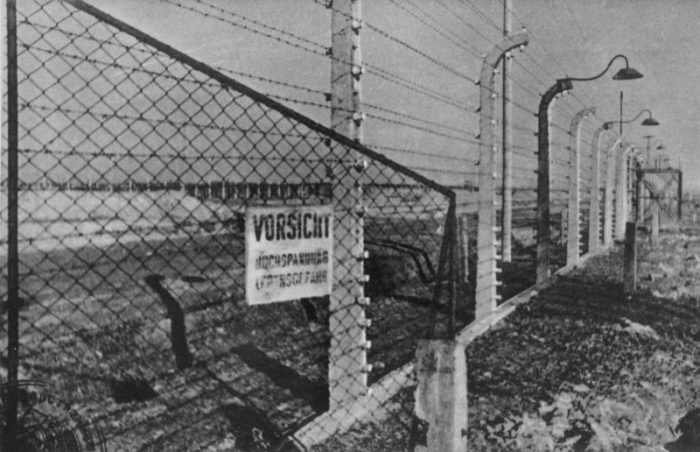
A view of the electrified fence in Auschwitz. the sign reads, “Caution! High voltage. Danger to life.” Many inmates committed suicide on this fence.
Before the Nazis came to power, Edgar [Mowrer, Chicago Daily News] made a habit of going into such [Brownshirts] hangouts to buy the brawlers beers and try to learn more about their views. As Lilian [his wife] described it, these young toughs rallied to slogans like “We spit on freedom” and “Beat the Red Front to pulp.” Their favorite toast: “Germany awake, perish the Jew!” “But just where did you learn all this interesting stuff about the Jew?” Edgar asked on one occasion. “Aber Herr, everybody in Germany knows that the Jews are our misfortune,” one of the Nazis replied. “But just how? Why?” Edgar persisted. “There are too many of them. And then, Jews are not people like the rest of us.” “But in my country the proportion of Jews is much higher than in Germany. But we lost no war, have not starved, not been betrayed to foreigners; in short, have suffered none of the evils you attribute to the presence of Jews in Germany. How do you account for this?” “We don’t account for it. We simply know it is true,” the Nazi replied, complaining that the Jews were getting the best jobs for themselves by “stealth and fraud.” Germans were waking up to that, he added, “and no matter how hard the Jew works, he won’t be on top long.” “Then you admit the Jew works harder?” Edgar asked. “Of course.” “But doesn’t the hardest worker deserve the best jobs?” His interlocutor suddenly sounded uncertain. “Yes – that is, no; not if he is a Jew.” “Is that logical, is that clear thinking?” “Ach, thinking!” The exasperated Nazi replied. “We are sick of thinking. Thinking gets you nowhere. The Führer himself says true Nazis think with their blood.” And this kind of lack of thinking was everywhere. — HITLERLAND by Andrew Nagorski
I remember: it happened yesterday, or eternities ago. A young Jewish boy discovered the Kingdom of Night. I remember his bewilderment, I remember his anguish. It all happened so fast. The ghetto. The deportation. The sealed cattle car. The fiery altar upon which the history of our people and the future of mankind were meant to be sacrificed. I remember he asked his father, “Can this be true? This is the twentieth century, not the Middle Ages. Who would allow such crimes to be committed? How could the world remain silent?” And now the boy is turning to me. “Tell me,” he asks, “what have you done with my future, what have you done with your life?” and I tell him that I have tried. That I have tried to keep memory alive, that I have tried to fight those who would forget. Because if we forget, we are guilty, we are accomplices. — NIGHT by Elie Wiesel
“While in a concentration camp early in the war, Cyla Wiesenthal became separated from her husband. Afterward, she wrote to a lawyer friend in Krakow, Poland, asking him to help locate her husband’s remains. Coincidentally, Simon Wiesenthal had also written to the same lawyer with a similar request that he help find his wife’s body. Thus, the two were reunited. When they calculated how many members of their immediate families had survived the war, they were shattered to find that the answer was none. In all, eighty-nine of their relatives had been murdered.” — Martin Dugard
“The permanent elimination of the Jews from the territories of Greater Germany can no longer be realized through emigration but by the use of implacable force in the camps in the East.” — Martin Bormann
Helene [the American wife of Hitler’s pal and Harvard graduate, Putzi Hansfstaengl in the 1920’s] was fascinated by Hitler’s inclination “to talk and talk and talk,” as she put it. “Nobody else had the chance to say anything. I remember, too, that he couldn’t stand anyone who wanted to talk. He was the one who talked; the others listened. That was why he couldn’t stand some people: because he talked too much.” — HITLERLAND by Andrew Nagorski
The German people will be burdened with a guilt the world will not forget in a hundred years. — Henning von Tresckow
[Franklin] Roosevelt signaled his intent to pursue a global disarmament agenda. On May 16, 1933, he appealed to world leaders to begin scrapping all offensive weapons and to pledge not to engage in acts of aggression. The next day, Hitler appeared at the Reichstag to deliver his own “Peace Speech.” Calling the American president’s proposal “A ray of comfort for all who wish to cooperate in the maintenance of peace,” Hitler professed his country’s willingness to renounce all offensive weapons and “to disband her entire military establishment” if her neighbors would do the same thing. War was “unlimited madness,” he added, calling for an end to old enmities and insisting that Germany was ready to live in peace with everyone. [Total killed in WWII – 60 million.] —HITLERLAND by Andrew Nagorski
God, I hate the Germans. — General Dwight D. Eisenhower in a letter to his wife Mamie, September 1944
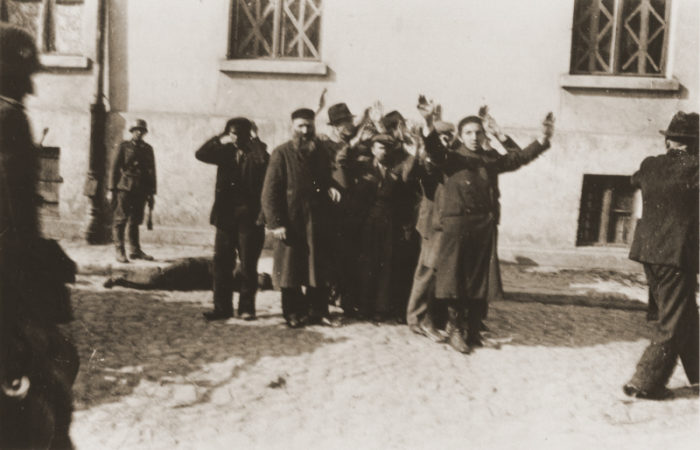
German soldiers round-up a group of Jewish men in Czestochowa, Poland
During a speech on German radio on January 29, 1939, to mark the Day of the German Police, Heinrich Himmler made a rare public reference to the SS concentration camps. After reassuring his listeners about the decent conditions in the “strict but fair” KL [KL is a German abbreviation for concentration camp], Himmler turned to their function: “The slogan that stands above these camps is: There is a path to freedom. Its milestones are: obedience, diligence, honesty, orderliness, cleanliness, sobriety, truthfulness, readiness to make sacrifices, and love of the fatherland.” The SS was so taken with Himmler’s motto that it was soon displayed in several KL – on signs, roofs, and walls – for all inmates to see… During the war, guards in Sachsenhausen would direct new inmates to the solemn slogan from Himmler’s 1939 speech, painted in huge letters on the barracks around the roll call square, and then point to the nearby crematorium: “There is a path to freedom, but only through this chimney!” — KL – A HISTORY OF THE NAZI CONCENTRATION CAMPS, By Nicolaus Wachsmann
The numbers of medals and citations earned by Jewish soldiers in the various Allied armies reflected the soldiers’ motivation in participating in the huge struggle. Some 160,772 Jewish solders received decorations in the Soviet Army, 36,352 in the American Army and many thousands more in other Allied forces. — HITLER’S SHADOW WAR, By Donald M. McKale
The SS could be trusted by Hitler to place all allegiances to him ahead of morality. That old-fashioned tribal blood brotherhood was like a magical ritual. Neither morality nor ethics existed any longer wherever the SS ruled. — THE PHONY WAR, By John Harte
Churchill was a fervent Zionist, writing in a 1920 article that “they [the Jews] are beyond question the most formidable race which has ever appeared in the world. — THE PHONY WAR, By John Harte
“When history looks back, I want people to know the Nazis weren’t able to kill millions of people and get away with it.” — Simon Wiesenthal
“I had 3,000 Einsatzgruppen members who every day went out and shot as many Jews as they could and Gypsies as well. I tried twenty-two, I convicted twenty-two, thirteen were sentenced to death, four of them were actually executed, the rest of them got out after a few years. The other 3,000 – nothing ever happened to them.” — Benny Ferencz
It’s time now for something to be done. He who has the courage to act must know that he will probably go down in German history as a traitor. But if he fails to act, he will be a traitor before his own conscience. — Claus Schenk von Stauffenberg
“For Jews, I only sign death certificates.” — Sachsenhausen SS camp doctor
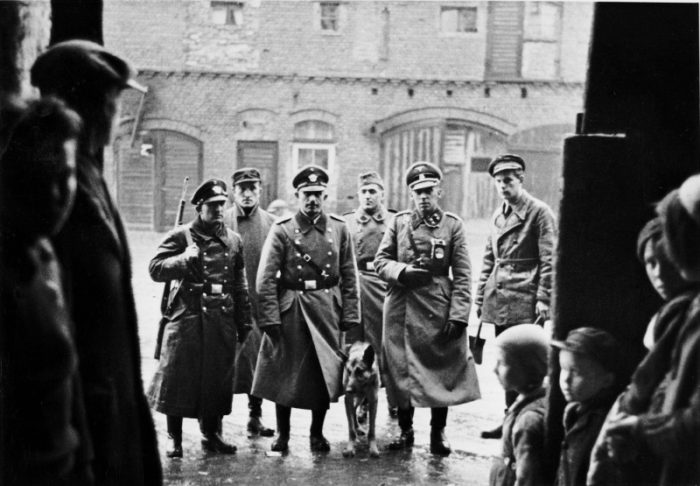
A group of SS, police, and ethnic German auxiliaries prepare to conduct a search for Jews during the “pacification” of Bydgoszcz, Poland in the opening months of the war.
“Close your hearts to pity!” Hitler told his military commanders ten days before sending his armies off to war against Poland. “Act brutally! …Be harsh and remorseless! Be steeled against all signs of compassion!” He did not want the army to simply defeat the Polish forces; he wanted “the physical annihilation of the enemy…I have put my Death’s Head formations at the lead with the command to send man, woman, and child of Polish descent and language to their deaths, pitilessly and remorselessly.” — THE DEVIL’S DIARY, By Robert K. Wittman & David Kinney
“His voice was excellently modulated his hands well-shaped and carefully groomed, and he moved gracefully and self-confidently. The only blemish in the perfection of his personality was that he had killed ninety thousand people.” – Judge Michael Musmanno, describing defendant Otto Ohlendorf, commander of an execution squad on the Eastern front. — THE NAZI HUNTERS, By Andrew Nagorski
“With few exceptions, the men who are running this government are of a mentality that you and I cannot understand. Some of them are psychopathic cases and would ordinarily be receiving treatment somewhere.” — George S. Messersmith, U.S. General Consul for Germany, 1933
“The liberation [of Germany] requires more than diligence; to become free requires pride, will, spite, hate, hate, and once again, hate.” – Adolf Hitler, 1923 — HITLER WAS MY FRIEND: THE MEMOIRS OF HITLER’S PHOTOGRAPHER, By Heinrich Hoffmann
Papen was a protégé of President Hindenburg, who affectionately called him Franzchen, or Little Franz. With Hindenburg in his camp, Papen and fellow intriguers had imagined they could control Hitler. “I have Hindenburg’s confidence,” Papen once crowed. “Within two months we will have pushed Hitler so far into a corner that he’ll squeak.” It was possibly the greatest miscalculation of the twentieth century. As a historian John Wheeler-Bennett put it, “Not until they had riveted the fetters upon their own wrists did they realize who indeed was captive and who captor.” — IN THE GARDEN OF BEASTS, By Erik Larson
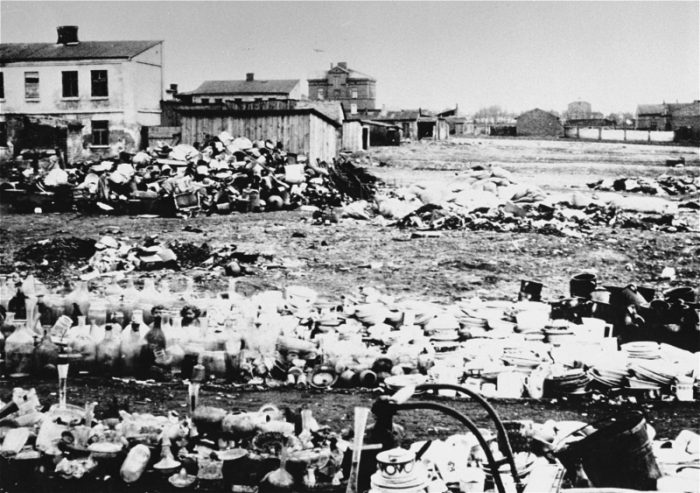
The abandoned property of Jews who have been deported from a small Polish ghetto piled in an open field.
“I never had a German come up to me and say I’m sorry all the time I was in Germany. That was my biggest disappointment: nobody, including my mass murderers, ever said I’m sorry. That was the mentality.” – Benjamin Ferencz, Chief Prosecutor, Nuremberg. — THE NAZI HUNTERS, By Andrew Nagorski
Until Hitler the world center of nuclear research had been Gottingen; in 1933 it shifted to America. It is an interesting speculation that, but for Hitler’s anti-Semitism, Germany and not America might have been the first power to develop an atom bomb. Handicapping himself with anti-Semitism was without doubt Hitler’s first serious mistake, a mistake that is still being underestimated. — THE MEANING OF HITLER, By Sebastian Haffner
For the first time in my life I felt nervous at Headquarters! One thought was paramount in my mind: since Stalingrad, Hitler has become a different person; this is not the Hitler of the old days, this is the Hitler face to face with inevitable collapse, eclipse and annihilation! — HITLER WAS MY FRIEND: THE MEMOIRS OF HITLER’S PHOTOGRAPHER, By Heinrich Hoffmann
Hitler declared, “In the end, blood is stronger than any documents of mere paper. What ink is written will one day be blotted out by blood.” Versailles, the Locarno Treaty, anti-aggression pacts – these were all just scraps of paper to Hitler. The Volk, war, and imperial expansion were all that mattered. — HITLER’S FURIES, By Wendy Lower
“Woe to the land of murderers. We will get our terrible revenge for everything.” Soviet Marshal Gregory Zhukov — THE NAZI HUNTERS, By Andrew Nagorski
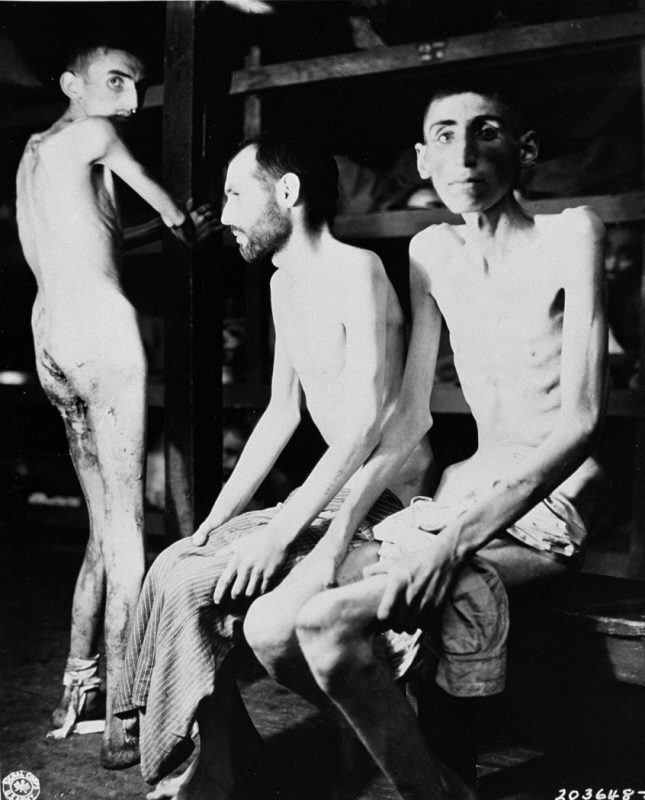
Three emaciated survivors in a barracks in the newly liberated Buchenwald concentration camp.
Adolf Eichmann repeatedly visited Auschwitz to coordinate the so-called Final Solution. He built a close relationship with his “dear comrade and friend” Rudolf Hoss, whom he admired for his “exactness,” his “modesty,” and his “exemplary family life.” The taciturn Hoss recognized Eichmann as a kindred spirit, too, addressing him with the informal “Du,” and after a long day’s work, inspecting the camp or driving to one of the new buildings, these two zealous managers of mass murder would relax in each other’s company, smoking and drinking heavily, followed by a joint breakfast the next morning. — KL – A HISTORY OF THE NAZI CONCENTRATION CAMPS By Nicolaus Wachsmann
“Terrible things were happening to German women. A cultivated German man explains with expressive gestures and broken Russian words that his wife has been raped by ten men that day.” – Vasily Grossman, Russian War Correspondent — THE NAZI HUNTERS, By Andrew Nagorski
After the attempt on his life on 20 July 1944: “If my life had come to an end then for me personally – I can say this – it would have merely been a liberation from worries, sleepless nights and grave nervous disease. It is only the fraction of a second, and then one is freed from all that and has one’s quiet and eternal peace.” – Hitler — THE MEANING OF HITLER, By Sebastian Haffner
To this day, there are no easy answers to the question why so many millions of Germans and Austrians, along with collaborators in most of the lands they conquered, could have willingly enlisted in a movement dedicated to mass murder. — THE NAZI HUNTERS, By Andrew Nagorski
“See what these sons of bitches did? See what these bastards did? I don’t want you to take a prisoner!” – General George S. Patton upon seeing Ohrdruf, a sub-camp of Buchenwald. — THE NAZI HUNTERS, By Andrew Nagorski
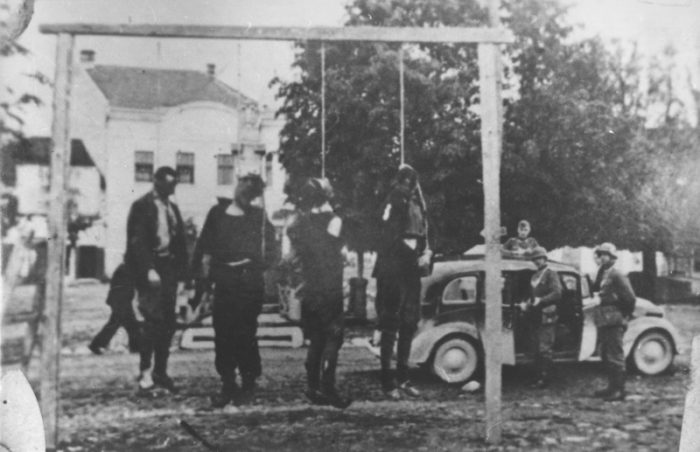
Public hanging of civilians by German troops.
One morning, I went in to clean Mengele’s offices. The doctors and Mengele were having their usual cups of coffee and asking Mengele why the Gypsies, Masons, Slavic races, and Jews were being eliminated. One of the doctors earnestly asked Mengele, “Why are we killing Jews? They never did anything to us. They have the best engineers, artists, scientists, doctors, musicians. Germany was built with streets named after Jews.” Mengele looked over his shoulder to make sure nobody was watching or listening. Then he leaned forward in his chair and looked at the doctor who asked the question…”Meine Lieben Kinder” (My dear children) Mengele said to the three doctors. “The Jewish people, no matter where they are, they become the best in the world. Yes, you’re right. They have all kinds of medicine, music, and scientific discoveries… There can’t be two smart peoples in the world. We’re going to win the war, so only the Aryan race will stand.” — DEFY THE DARKNESS, By Joe Rosenblum with David Kohn
“He’s from my homeland. A human being.” — Antoni Slonimski, 1943 – Black Earth, By Timothy Snyder
By mid-1944 there were a mere 1,084 Jews left in Bavaria, in Germany as a whole fewer than 15,000. — HITLER, THE GERMANS, AND THE FINAL SOLUTION, By Ian Kershaw
“It is neither easy nor agreeable to dredge this abyss of viciousness, and yet I think it must be done, because what could be perpetrated yesterday could be attempted again tomorrow, could overwhelm us and our children.” — Primo Levi – The Drowned and the Saved (1988)
Berlin and the Continent had been so wonderful, [William] Shirer reflected “until the war came and the Nazi blight and the hatred and the fraud and the political gangsterism and the murder and the massacre and the incredible intolerance and all the suffering and the starving and the cold and the thud of a bomb blowing the people in the house to pieces, the thud of bombs blasting man’s hope and decency.” — STELLA, By Peter Wyden
In a letter home the future American ambassador George Kennan, then at the consulate in Berlin, was indignant at the Judenstern. “That is a fantastically barbaric thing,” he wrote. “I shall never forget the faces of people in the subway with the great yellow star sewed onto their overcoats, standing, not daring to sit down or brush against anybody, staring straight ahead of them with eyes like terrified beasts.” — STELLA, By Peter Wyden
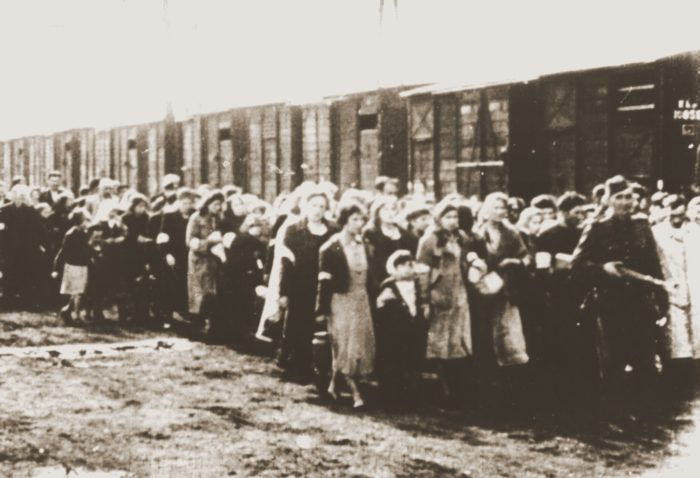
Jews during an unidentified deportation action.
According to the evidence of former internees at Birkenau, many eminent Nazi personalities, political men and others, were present when the crematory and the gas chambers were inaugurated. They were reported to have expressed their admiration for the functional capacity of the enormous extermination plant. On the inauguration day 12,000 Polish Jews were put to death, a minor sacrifice to the Nazi Moloch. — FIVE CHIMNEYS, Olga Lengyel
“We know in detail what occurred, we know the sequence of events and their probable interaction, but the profound dynamics of the phenomenon escapes us. And what likewise escapes us is the almost immediate disintegration of the German political, institutional, and legal structures, as well as of the moral forces that by their very nature ought to have been important obstacles to the Nazis in Germany, in the other European countries, and in the entire Western world.” — Saul Friedlander – HITLER AND THE FINAL SOLUTION, By Gerald Fleming
“To kill thousands of people, you need only several people with guns, and these people don’t risk anything except their souls. But to save one person, you need the tremendous courage of many people. All the rescuers were saints.” — Irena Veisaite, Survivor – WE ARE HERE, By Ellen Cassedy
“We’ll not capitulate. Never. We can go down. But we’ll take a world with us.” – Hitler, to his Luftwaffe adjutant, Nicolaus von Below, December 1944 — HITLER, By Ian Kershaw
Hitler found employment in Munich [1919], working for the army in persuading returning German prisoners-of-war at Lechfeld camp to turn their backs on defeatism and the Left. He took as his theme the corrupting influence of a ‘Jewish Marxist world conspiracy,’ stimulating a new source of national ferment that had not been present among the forces for disruption in 1914. — THE FIRST WORLD WAR, By Martin Gilbert
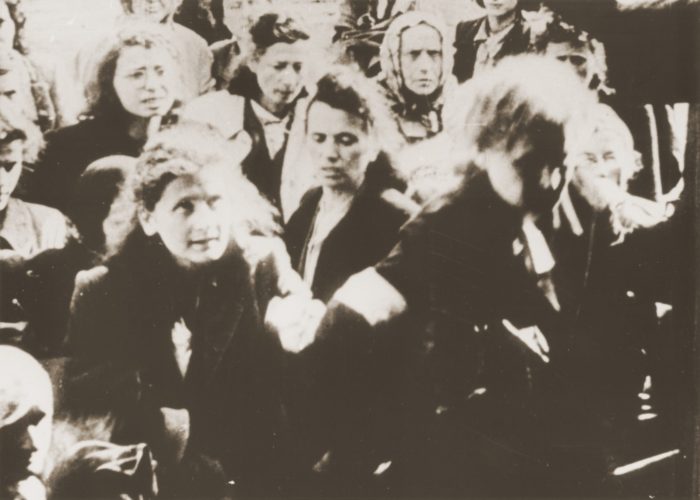
Fearful Jews on the platform during a deportation from the Warsaw ghetto to a death camp.
“Where books are burned, in the end people will be burned too.” — Heinrich Heine
Decades would not fully erase the simple but compelling sentiment painted in huge letters at the scene of Hitler’s annual celebration of the 1923 Putsch, the Feldherrnhalle in Munich, in May 1945: “I am ashamed to be a German.” — HITLER, By Ian Kershaw
The cliché “banality of evil” was coined by Hannah Arendt, a U.S. Jewish intellectual who covered the 1961 trial of Adolf Eichmann in Jerusalem. Unfortunately she had little detailed knowledge of how millions of her people had been exterminated, otherwise she might have chosen her words more carefully. While it is true that Eichmann himself worked far from the stench of burning human flesh, surrounded by the familiar smell of offices everywhere, the suggestion that many of those involved in the Final Solution were simply unimaginative clerks has been one of the more persistent alibis used to minimize their whole-hearted participation in the revolting enterprise. — MORAL COMBAT, By Michael Burleigh
Hitler was the main author of a war leaving over 50 million dead and millions more grieving their lost ones and trying to put their shattered lives together again. Hitler was the chief inspiration of a genocide the like of which the world had never known, rightly to be viewed in coming times as a defining episode of the twentieth century. — HITLER, By Ian Kershaw
A few days later I [Speer] accepted the sentence [20 years imprisonment]. I waived the right to an appeal to the Four Powers. Any penalty weighed little compared to the misery we had brought upon the world. “For there are things,” I noted in my diary a few weeks later, “for which one is guilty even if one might offer excuses – simply because the scale of crimes is so overwhelming that by comparison any human excuse pales to insignificance.” — INSIDE THE THIRD REICH, By Albert Speer
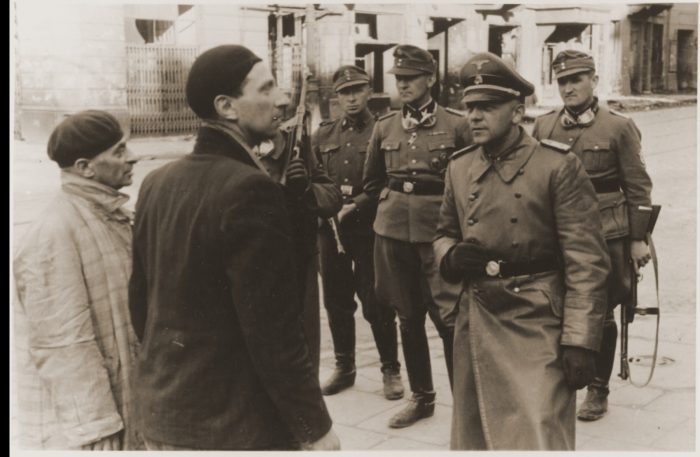
SS Gruppenführer Maximilian von Herff questions two Jewish resistance fighters during the suppression of the Warsaw ghetto uprising as SS Major General Juergen Stroop (rear, center) and his security detail look on. Stroop was hanged after the war.
Without Hitler, the creation of a program to bring about the physical extermination of the Jews of Europe is unimaginable. — HITLER, THE GERMANS, AND THE FINAL SOLUTION, By Ian Kershaw
The Nazis (and their partners in crime) tried fundamentally to alter the moral understanding of humanity, in ways that deviated from the moral norms of Western civilization. They did this by locating their murderous depredations beyond law, but within a warped moral framework that defined their purifying violence as necessary and righteous. – MORAL COMBAT, By Michael Burleigh
“To wage war, by sea, land and air, with all our might and with all the strength that God can give us; to wage war against a monstrous tyranny, never surpassed in the dark, lamentable catalogue of human crime. That is our policy.” — Winston Churchill
Hitler killed himself on 30 April, his final testament focused obsessively on the Jews, hatred of whom was the animating principle of his adult life. Even as he was on the brink of death, they crowded into his thoughts, though so many Jews had become ghosts. — MORAL COMBAT, By Michael Burleigh
“The biggest mistake was the war with Russia. Whatever the courage and readiness for sacrifice, you can’t take on an entire world… We just bit off too much to chew.” – German Soldier – HITLER, By Ian Kershaw
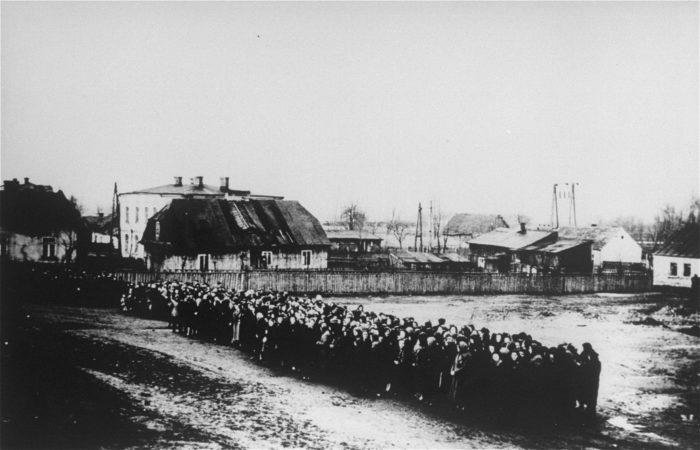
View of a column of Jews lined up along a road during a resettlement or deportation action.
As the Second World War finally reached its end in Europe, millions of people who had been uprooted, torn from their communities and their families, desired nothing more than to return home and pick up the pieces of their former lives. — GERMANY 1945, By Richard Bessel
The consistency of Hitler’s aim “to remove” Jews, and the fact that, during the years of his dictatorship, the Jews were indeed “removed,” first from Germany, then from the whole German-occupied Europe, through ruthless persecution and ultimately physical annihilation, seems to offer a straightforward answer to the question of Hitler’s role in the “Final Solution.” — HITLER, THE GERMANS, AND THE FINAL SOLUTION, By Ian Kershaw
